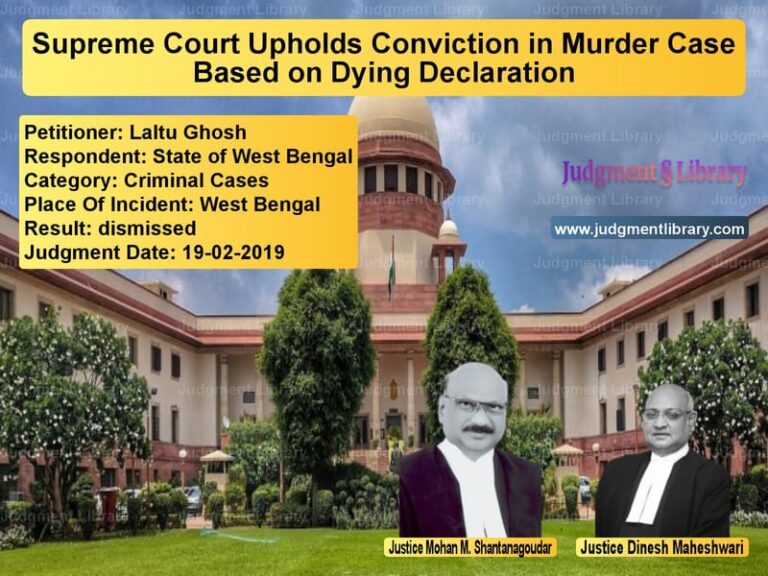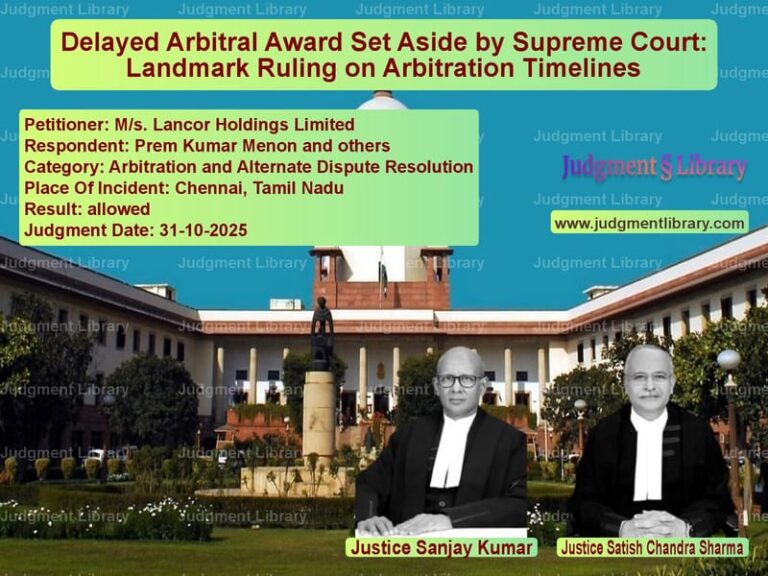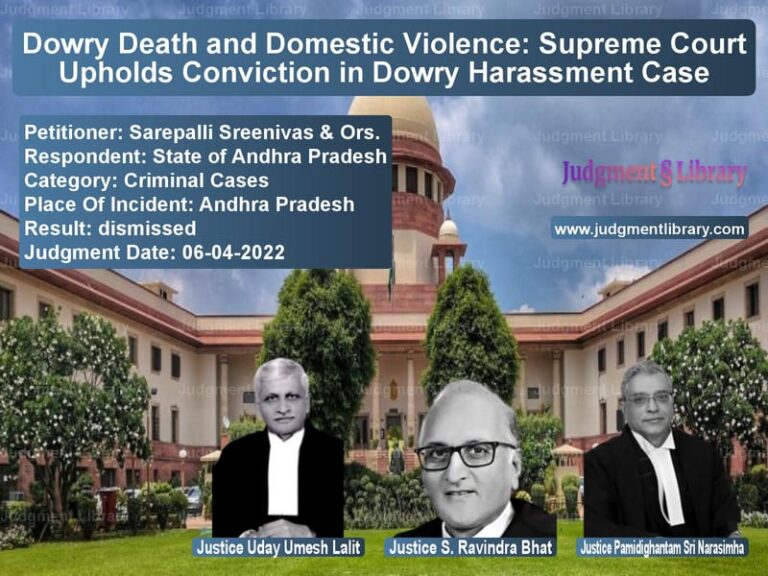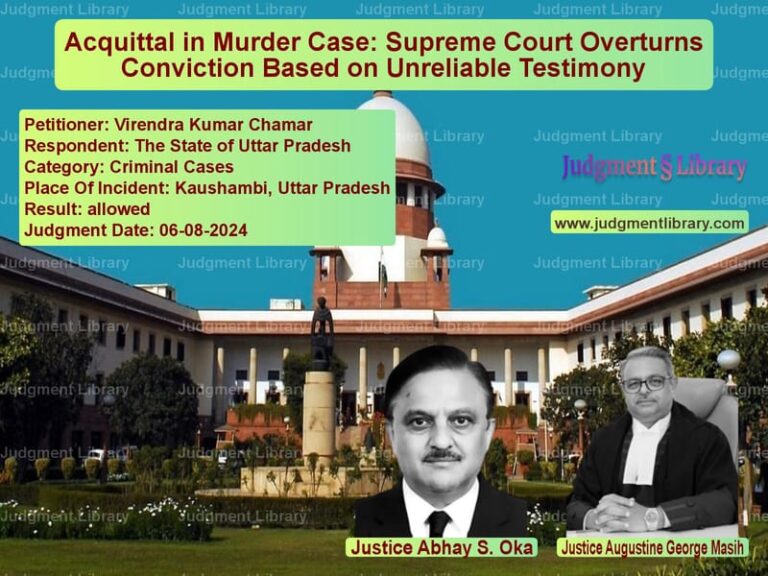Supreme Court Grants Divorce on Grounds of Desertion, Orders ₹30 Lakh Alimony
The case of X v. Y revolves around a long-standing matrimonial dispute that resulted in multiple litigations over nearly two decades. The Supreme Court, in its judgment dated July 8, 2024, granted a divorce to the appellant-husband on the grounds of desertion under Section 13(1)(ib) of the Hindu Marriage Act, 1955 (HMA). Additionally, the Court directed the appellant to pay ₹30 lakhs as a one-time alimony to the respondent-wife.
The judgment highlights important aspects of matrimonial law, including the significance of desertion as a ground for divorce, the enforcement of a decree for restitution of conjugal rights, and the concept of irretrievable breakdown of marriage.
Background of the Case
The marriage between the parties was solemnized on March 25, 1999. They had two children, both of whom are now adults. The marital discord began in 2006, leading to prolonged litigation.
Legal Proceedings Initiated
- December 17, 2008: The appellant filed a petition under Section 9 of the HMA for restitution of conjugal rights.
- May 15, 2013: The Family Court passed a decree for restitution of conjugal rights, directing the respondent to rejoin the appellant.
- February 19, 2015: The Punjab and Haryana High Court upheld the decree for restitution of conjugal rights.
- August 23, 2013: The appellant filed a petition under Section 13 of the HMA seeking divorce on the grounds of cruelty and desertion.
- August 1, 2016: The Family Court granted a decree of divorce.
- October 4, 2019: The Punjab and Haryana High Court set aside the divorce decree, ruling that the appellant failed to establish the grounds of desertion and cruelty.
Arguments by the Appellant
The appellant contended:
- The respondent had deserted him since 2008 without reasonable cause.
- The decree for restitution of conjugal rights was not complied with by the respondent, proving her intent to desert him.
- Her continuous refusal to return to the matrimonial home caused mental cruelty.
- The Family Court was correct in granting the decree of divorce, and the High Court erred in reversing it.
Arguments by the Respondent
The respondent argued:
- The High Court rightly held that the appellant had failed to prove desertion.
- The appellant neglected his duties as a husband, forcing her to leave.
- There was no material evidence to show that she deliberately refused to cohabit with the appellant.
Supreme Court’s Observations
The Supreme Court examined whether the High Court was justified in setting aside the divorce decree.
1. Non-Compliance with Restitution of Conjugal Rights Decree
The Court noted that:
- The Family Court had already ruled in 2013 that the respondent left the appellant without reasonable cause.
- The decree for restitution of conjugal rights was confirmed by the High Court in 2015.
- Despite these rulings, the respondent made no effort to resume cohabitation with the appellant.
The Court ruled:
“The respondent left the appellant’s company without reasonable cause. The decree for restitution of conjugal rights was confirmed, yet no effort was made by her to resume cohabitation.”
2. Desertion as a Ground for Divorce
Under Section 13(1)(ib) of the HMA, a spouse can seek divorce if the other party has deserted them for at least two years. The Court held that:
- The respondent’s desertion continued from 2008 till the filing of the divorce petition in 2013, exceeding the two-year requirement.
- The respondent did not provide any reason for not resuming cohabitation even after the decree for restitution of conjugal rights.
The Court concluded:
“The desertion of the appellant since 2008 without reasonable cause fulfills the conditions under Section 13(1)(ib) of the Hindu Marriage Act.”
3. Irretrievable Breakdown of Marriage
The Court observed that:
- The parties had lived separately for over 16 years.
- Attempts at reconciliation, including mediation, had failed.
- Prolonging the marriage served no meaningful purpose.
The Court remarked:
“This is a case of complete breakdown of marriage, making it impossible for the parties to cohabit.”
Supreme Court’s Final Verdict
The Supreme Court ruled:
- The appeal was partly allowed, and the divorce decree was reinstated.
- The marriage between the parties was dissolved under Section 13(1)(ib) of the HMA.
- The decree would come into force only after the appellant paid ₹30 lakhs as one-time alimony.
- The respondent was required to provide her bank details within three weeks, failing which the appellant could deposit the amount with the Supreme Court.
Conclusion
The Supreme Court’s judgment in X v. Y reinforces the principle that prolonged separation and non-compliance with a decree for restitution of conjugal rights constitute desertion under matrimonial law. The decision also emphasizes that when a marriage has irretrievably broken down, courts should facilitate a fair resolution, including reasonable financial compensation for the spouse.
Petitioner Name: X.Respondent Name: Y.Judgment By: Justice Abhay S. Oka, Justice Ujjal Bhuyan.Place Of Incident: Barnala, Punjab.Judgment Date: 07-07-2024.
Don’t miss out on the full details! Download the complete judgment in PDF format below and gain valuable insights instantly!
Download Judgment: x-vs-y-supreme-court-of-india-judgment-dated-07-07-2024.pdf
Directly Download Judgment: Directly download this Judgment
See all petitions in Alimony and Maintenance
See all petitions in Divorce by Desertion
See all petitions in Mutual Consent Divorce
See all petitions in Judgment by Abhay S. Oka
See all petitions in Judgment by Ujjal Bhuyan
See all petitions in allowed
See all petitions in Modified
See all petitions in supreme court of India judgments July 2024
See all petitions in 2024 judgments
See all posts in Divorce Cases Category
See all allowed petitions in Divorce Cases Category
See all Dismissed petitions in Divorce Cases Category
See all partially allowed petitions in Divorce Cases Category







